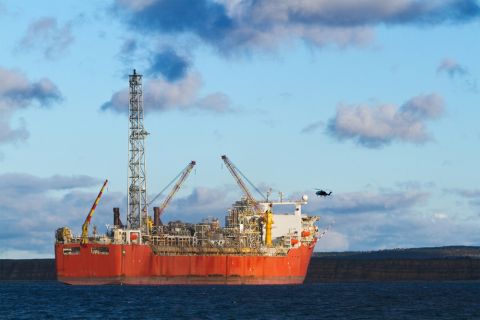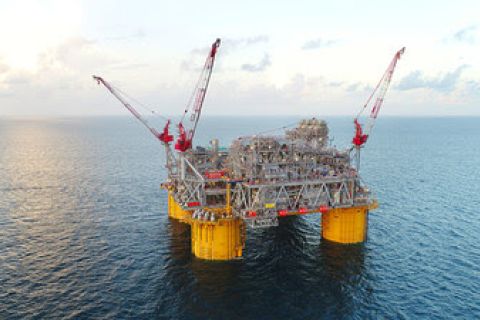Oklahoma City-based Kerr-McGee Corp. (NYSE: KMG) plans to buy Westport Resources Corp., Denver, (NYSE: WRC) in a stock-for-stock merger valued at approximately $3.4 billion, becoming the fifth-largest U.S. independent oil and gas producer and shifting its portfolio more toward gas. The new Kerr-McGee will have proved reserves of about 1.3 billion BOE, 57% gas and 76% U.S., and daily production of about 1.2 billion cu. ft. of gas and about 160,000 bbl. or oil. It will also be the largest independent holder of deepwater blocks in the Gulf of Mexico, have more than 71 million gross undeveloped acres worldwide and have titanium dioxide production capacity of 668,000 tons per year (gross). Its net debt-to-total-capitalization ratio will be about 42% (by year-end), down from 54% currently. Its equity market capitalization will be approximately $7.7 billion, and its total enterprise value, approximately $11.7 billion. Westport has 297 million BOE of proved reserves, putting the implied deal value at $11.45 per BOE-substantially higher than the recent high-water mark of an implied $9 per BOE that Devon Energy Corp. paid for Ocean Energy Inc. last year. Kerr-McGee's stock price fell more than 4% the day the deal was announced-a day in which Nymex crude oil prices jumped $1.18. "Obviously, I'm not the only one who does not like the deal," says Fadel Gheit, an analyst with Oppenheimer, citing the $11.45/BOE figure. But while it's "tempting" to calculate this merger by its implied transaction value, that approach "misses the heart of the deal," says Dave Hager, Kerr-McGee senior vice president, E&P. Of the $3.4-billion purchase price, only $2.15 billion is allocated to the proved reserves-equating to about $7.23 per BOE. Some $930 million is allocated to about 300 million BOE of probable and possible resources-or $3.10 per BOE. Kerr-McGee expects to convert these resources into proved developed reserves at a cost of roughly $3.75 per BOE. Some $300 million has been allocated to exploitation and exploration activities, and $50 million went toward gathering assets. Westport-whose portfolio leans toward U.S. onshore gas assets-is a great complement to the Kerr-McGee portfolio, says Kerr-McGee chairman and chief executive officer Luke R. Corbett. "Westport's extensive inventory of low-risk U.S. exploitation opportunities complements Kerr-McGee's high-impact deepwater exploration program, providing us a more predictable performance profile," Corbett says. Westport is active in the Rocky Mountains, Permian Basin, Midcontinent, Gulf Coast and Gulf of Mexico. The addition of Westport will increase Kerr-McGee's proved reserves nearly 30% and its daily production more than 34%. Assuming an Aug. 1 close, Kerr-McGee expects its pro forma 2004 production to reach 300,000 BOE a day-compared with 271,000 on a stand-alone basis in 2003-and to grow to 385,000 BOE per day in 2006. "We're back on the growth track, and we're back on the growth track in a big way," Hager says. Lloyd Byrne, an analyst with Morgan Stanley, says the deal makes strategic sense, as the pro forma production base and opportunity set are more balanced between lower-risk exploitation and higher-risk exploration activity. "Kerr-McGee's lackluster production results in recent years, despite the contribution from several larger projects, evidences the historical lack of exploitation depth, in our view." However, Byrne says he would like to better understand the motivations behind this deal. "Why is Westport willing to accept [a purchase price of about] 4.5 times cash flow, with so much identifiable probable and possible upside? Alternatively, what makes Kerr-McGee so comfortable it can efficiently exploit possible and probable reserves at the estimated $3.75 per BOE, when Westport's SEC-10 estimate for PUD conversion costs is closer to $6.50 per BOE, per [its] 2003 10-K?" The deal value includes about $900 million of Westport debt, and Kerr-McGee is issuing 49.4 million new shares in the stock-swap. Cost savings of approximately $40 million a year are expected. Kerr-McGee has entered into hedges, primarily in the form of costless collars, that when combined with Westport's existing hedges, cover approximately 90% of Westport's anticipated proved production through 2006. Under the deal terms, Westport shareholders will receive 0.71 share of Kerr-McGee common stock per Westport common share. Before the deal is closed, Westport will redeem all of its 6.5% convertible preferred stock at an anticipated redemption price of $25.65 per share. Kerr-McGee's executive management team will continue in its current role after the close of the transaction. One of the current Westport board members will join the Kerr-McGee board, increasing the size to 10 members. The transaction is expected to be completed during the third quarter. Standard & Poor's Ratings Services placed its long-term BBB corporate credit rating on Kerr-McGee on CreditWatch with negative implications, and lowered its short-term debt rating on the company to A-3 from A-2. S&P also placed its BB corporate credit rating on Westport on CreditWatch with positive implications. "Specifically, we are concerned about Kerr-McGee's very high finding and development costs, a problem shared by Westport; the still-high component of undeveloped reserves; the large amount of future spending associated with developing these reserves; the company's significant debt leverage; and whether it will be able to achieve debt reduction from internally generated cash-something it has not demonstrated on a consistent basis," says S&P credit analyst John Thieroff. Kerr-McGee estimates its unit operating costs will fall 25 cents per BOE after the deal. Moody's Investors Service affirmed its Baa3 senior unsecured debt rating on Kerr-McGee with a negative outlook, and placed Westport's Ba2 senior implied and Ba3 senior subordinated ratings under review for upgrade. Moody's says Kerr-McGee's leverage will improve from $7.60 per proved developed BOE to $6.90, but remains high relative to investment-grade peers. And, Westport's relatively high full-cycle costs won't give much help to Kerr-McGee in that area. However, Moody's noted that the larger, more-balanced production base should provide an improved mix of cash-generating assets. And, hedged production should result in incremental cash flow of $150- to $250 million in 2005 and 2006 that can be used to pay debt. "Kerr-McGee still needs to execute its plan and deliver results that demonstrate sustainable improving trends in production, leverage and unit costs," Moody's reports. -Jodi Wetuski
Recommended Reading
US Raises Crude Production Growth Forecast for 2024
2024-03-12 - U.S. crude oil production will rise by 260,000 bbl/d to 13.19 MMbbl/d this year, the EIA said in its Short-Term Energy Outlook.
Iraq to Seek Bids for Oil, Gas Contracts April 27
2024-04-18 - Iraq will auction 30 new oil and gas projects in two licensing rounds distributed across the country.
TotalEnergies Starts Production at Akpo West Offshore Nigeria
2024-02-07 - Subsea tieback expected to add 14,000 bbl/d of condensate by mid-year, and up to 4 MMcm/d of gas by 2028.
Well Logging Could Get a Makeover
2024-02-27 - Aramco’s KASHF robot, expected to deploy in 2025, will be able to operate in both vertical and horizontal segments of wellbores.
Shell Brings Deepwater Rydberg Subsea Tieback Onstream
2024-02-23 - The two-well Gulf of Mexico development will send 16,000 boe/d at peak rates to the Appomattox production semisubmersible.



